The Notts 10 mile road race is said to be the oldest road race in Nottinghamshire and is one of the oldest in the East Midlands. But last year its future was in doubt, after Notts AC, who had organised the race for 50 years, decided to discontinue it. As the Notts 10 was the only remaining 10-mile race in the county, this meant that there would be no longer be a County Championship 10-mile race.
Notts AC started the race in 1972. It was held every year until 2019. There was almost no racing in the UK in 2020 due to the Covid-19 pandemic. 2021 was a difficult year for race organisers as there were social mixing restrictions in place for most of the year1. parkrun did not restart until 24th July and many races were cancelled. Notts AC tried to revive the race in 2021 but had to defer and then cancel it. In 2022, they decided they no longer wanted to organise the race.
A revival
After a gap of three years, two local running clubs are reviving the Notts 10. My club, Holme Pierrepont Running Club, and Beeston AC are organising the 49th Notts 10 race. It will take place on Saturday 11th March 2023.
Notts 10 – the beginning
The first Notts 10 was held on Saturday 23rd September 1972. John Burney told the story of how the idea for the race came about in a publication celebrating the first twenty years of the race.2 Burney was the first race organiser.
Notts AC is based at Harvey Hadden Stadium3 in Nottingham. In 1972, there was a group of male runners who met at the stadium on a Tuesday evening for a club run of 9 to 10 miles. After the run they would repair to the Wheelhouse pub in Wollaton for a drink. It was this group that came up with the idea of a 10-mile race. Burney wrote:
For years, we had run the circuit of Midlands 10’s – Cambridge, Kettering, Holbeach, Heckington, Coventry, Michelin and so on and we thought that we should probably run one of our own. Like the man said, it seemed like a good idea at the time!
The organisers were keen to use the Harvey Hadden athletics track for the start and finish of the race so that they could use the clubhouse’s facilities. As the stadium is in a built-up area, this meant the course would be on busy roads. The route was agreed with the police and the local highways department. The race started with two laps of the track before taking in a 5-mile loop on the roads which the runners did twice before returning to the track for the finish. The road loop took in Wigman Road, Beechdale Road, Western Boulevard, Aspley Lane and Strelley Road.
A last-minute hitch
Burney recounts that the first race was almost cancelled. The organisers decided to mark the mile points from half-way with road markings in white paint. When a volunteer went out to paint the markings on the Friday evening, he was spotted by the Chairman of the Highways Department who was furious and threatened to put a stop to the race. The organisers apologised and hastily scrubbed off the paint. The race went ahead.
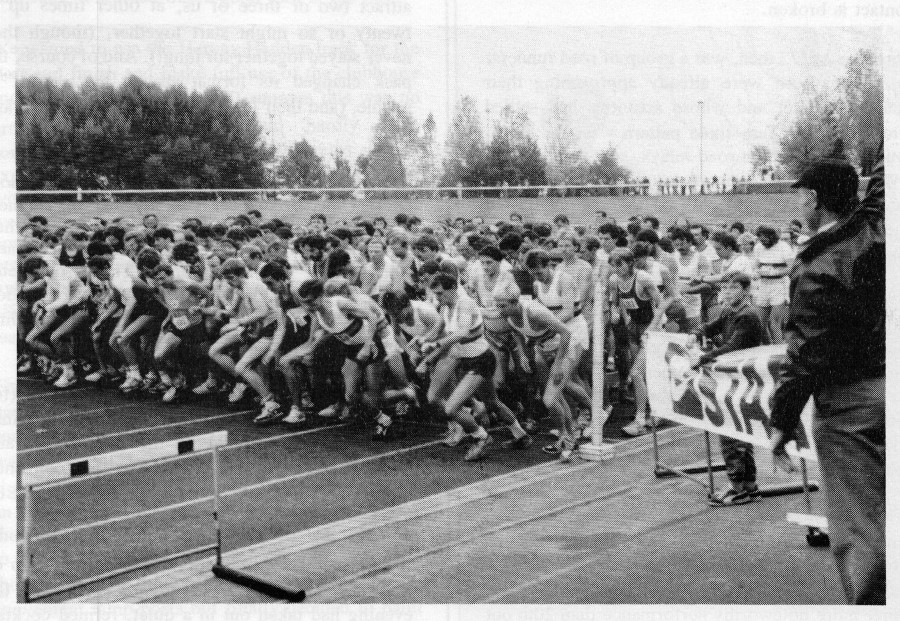
Runners lined up on the track at Harvey Hadden Stadium at the start of the Notts 10 in 1985
Notts 10 – the first races and two Olympians
The quality of the field was often very high in the 1970s. The first race in 1972 had 56 finishers, all under 70 minutes. The winner was Keith Angus of Sheffield AC in 49:12. The previous year he had set his personal best for 10 miles on the track, running 48:24 at Leicester. He finished second in the Notts 10 in 1974 and 1975. The following year, Angus was selected for the British Olympic team. He ran his all-time marathon personal best of 2:15:55 at the AAA Marathon Championship at Rotherham. This earned him a place at the 1976 Montreal Olympic Games. He finished 31st in the marathon.4
Colin Kirkham of Coventry Godiva was already an Olympian when he won the race in 1974 and 1975. In 1971, he had competed in the marathon in the European Championships in Helsinki finishing fourth. In 1972, he had run his all-time personal best of 2:15:17 at the Manchester Marathon in June. He was selected for the Munich Olympics Games, where he finished 20th in the marathon in 2:21:55.5
In 1974, there were 20 finishers in the race, which Kirkham won in 49:07. The 20th runner finished in 55:26. In 1975, Kirkham won again in 49:37 and there was a much larger field of 92 finishers. The slowest runner, a veteran (v40) took 80:34.
Road racing in the 1970s
Today, the vast majority of runners are distance runners competing on roads and trails. Road races are often big events with hundreds or thousands of competitors. But for most of the twentieth century long-distance road racing was a niche sport, reserved for men. Standards were high and it was not uncommon for marathons to have cut-offs of 3 hours or 3 hours 30 minutes.
Things didn’t change significantly until the jogging boom and marathon boom in the late 1970s and early 1980s which created the idea of running for all, for fun, fitness and health. Many adults entered the sport for the first time.
The impact of this can be seen in race numbers. For example, in April 2022 there were 13,924 finishers in the Manchester Marathon. This figure is probably higher than the total number of men who ran a marathon in the UK in 1972.
The most popular race distances in the 1950s, 1960s and early 1970s were 10 miles and 20 miles. Many county Amateur Athletic Associations organised championships for these distances (for men). There were also lots of races of non-standard distances, such as “round the houses” races. The half marathon became more common as a result of the marathon boom. Today the 10km may be the favourite distance. It is raced more often than the 10 miles6.
No women ran the Notts 10 in the early years. The Women’s Amateur Athletic Association did not permit to race further than 6000m on the roads until 1975 in the UK.
The impact of the marathon boom
The marathon boom had an impact on the Notts 10. From 1972 to 1980, the race had under 100 finishers each year. Then in 1981, the year of the first London Marathon, this number more than doubled to 240 finishers. Road racing opened up to a wider range of people. The number of finishers remained high throughout the decade as more women and veteran runners took part. Finishing times changed too. The slowest runner from 1972 to 1980 finished in under 1 hour and 23 minutes. Several races in the 1980s had one or more finishers taking over 1 hour and 30 minutes.
Women at the Notts 10 in the 1970s and 1980s
Women would not have been able to compete in the Notts 10 until 1975 at the earliest. In April 1975, the Women’s Amateur Athletic Association brought in new rules on an experimental basis. These allowed women aged 21 and over to race any distance on the roads up to and including the marathon. Even though the rules changed, race organisers did not always open their men’s races to women.
Race organisers sometimes put on a shorter distance event for women, alongside a men’s race. In 1976, Notts AC offered a shorter race to women for the first time. This was a 4000m race, presumably on the track. It took place half an hour before the men’s race which started at midday on Sunday 12th September. It was won by Christine Readdy of Stoke AC. In April that year she had won the first women-only marathon in the UK at Feltham. She had also become the first British woman to run a marathon in under 3 hours. Christine Readdy competed in the 4000m again in 1977 but was beaten by Rosemary Wright.
The first woman to finish the Notts 10 was Karen Smith of Burton AC in 1979. She was the only woman in the race and finished in 74th place in 65:28. The race had 79 finishers that year.
In the 1980s, the numbers of women participating increased, reaching 10%-11% of finishers by the end of the decade.
Notable women winners in the 1980s
In 1980, Eleanor Adams (now Robinson) of Sutton in Ashfield Harriers had her first win. She finished in 61:42 beating Karen Smith. Adams had taken up road running after a long break from athletics. She had finished second in the the inaugural People’s Marathon in Birmingham in May that year. Adams won the Notts 10 again in 1981 race in 62:04. The race had 240 finishers, nine of whom were women (4%). Adams began her ultrarunning career in 1982, but continued to compete regularly in road races, winning many of them. She won the Notts 10 in 1983, 1985 and 1988.
Jean Lochhead of Airedale and Spenborough AC and Linda Rushmere of Notts AC were also race winners in the 1980s on the original course. Jean Lochhead in 1982 and Linda Rushmere in 1987. Lochhead had competed for Wales at International and World Cross Country Championships and in the 1500m and 800m at the 1974 Commonwealth Games. In the early 1980s she was one of the best marathon runners in the country and was selected for the Evian Women’s Marathon Squad (see my post on Margaret Lockley). Rushmere would go on to compete in the marathon at the 1994 Helsinki European Championships.
1989 – a new course for the Notts 10
In 1989, the Notts 10 moved to a new location at the National Water Sports Centre at Holme Pierrepont. In the twentieth anniversary publication for the Notts 10, Simon Elliott, who was the race organiser at the time, writes that the main reason was the increase in traffic coupled with larger numbers of participants.
The writing was on the wall from the late eighties and the search was on for a new course. Police help was always going to be hard to get because they felt that their contribution to running was that of the Robin Hood Marathon. It didn’t take long for us to end up at the National Water Sports Centre at Holme Pierrepont. Here was a large park with a course that only involved a short length of public road which was effectively a cul-de-sac. As runners rapidly realise, there can’t be a flatter course in the country and that given the right field and a relatively windless evening, some very fast times will be recorded here.”
Another benefit was the use of the facilities at the Centre.
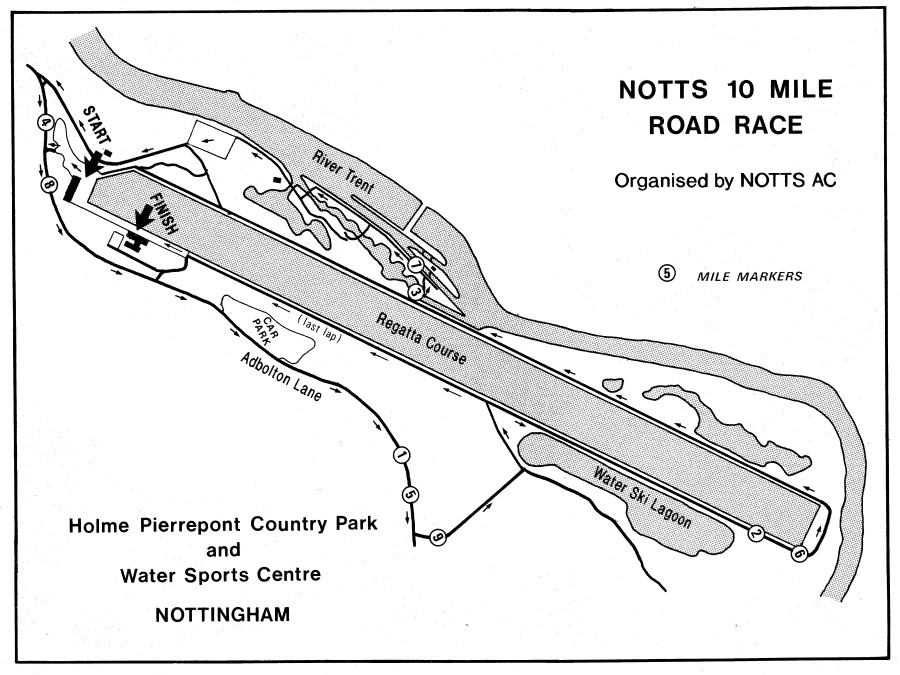
The route of the Notts 10 race in 1989
The first Notts 10 race over the new course took place in October and the conditions were not good with strong winds. Following this, Notts AC moved the race date to the first Friday in June with a 7.15pm start. It was usually held on this date in the following years. In 2011, the Notts 10 took place on Sunday 22nd May to accomodate the Midlands Counties Championships.
The 2023 race will be held at the National Water Sports Centre. The course is largely the same as the one adopted in 1989. The course record holders are:
Men: 49:01 – Alan Jackson, Stourport AC, 1993
Women: 53:57 – Gemma Steel, Charnwood AC, 2016
Final thoughts
I first started to research the Notts 10 in 2022, when I thought the race was not going to be held again. The 10 mile distance is my favourite for road racing and I felt sad that we would no longer have an event in Nottinghamshire. I am delighted that it is being revived. I will be volunteering at the race on 11th March.
My favourite road race is the Snake Lane 10 in Pocklington, East Yorkshire, which I’ve run seven times in the past ten years. Other 10 mile races I’ve run are the Notts 10, the Burton 10 in Burton upon Trent and the Yorkshire 10 in York. It’s hard to know if 10 mile races are in decline or have just not grown in number like the 10km and half marathon did. I believe that of the six Midlands 10-milers from the early 1970s that John Burney mentioned, only the Heckington 10 survives.
Do you have a favourite 10 mile race? Do you think 10-milers are dying out?
This is an incomplete history of the race but I may add more information to this post in future. I am very grateful to Simon Elliott for lending me the Notts 10 twentieth anniversary publication and to Margaret Madden for sending me the fortieth anniversary article from the club’s annual review.
Notes
- Timeline of UK government coronavirus lockdowns and measures, March 2020 to December 2021, Institute for Government.
- “Notts 10, The First Twenty Years”, Edited by: Simon Elliott and Chris Moore. Much of the detail about the early years of the race comes from this publication. A two-page article by Dennis Hackett celebrating 40 years of the Notts 10 was published in the Notts AC Annual Report 2012.
- Havey Hadden Stadium in Bilborough, Nottingham, was opened on 8th August 1959 by Sir Arthur Porritt. It was named after a local entrepreneur who left money in a trust for it to be built. It was upgraded to a synthetic (Tartan) track on 16th June 1974. The track was surrounded by a 479m cycle velodrome which was later removed. (Details from www.runtrackdir.com and Harvey Hadden Stadium Trust, Annual Report for the Year Ended 31st March 2022).
- Keith Angus’s profile on World Athletics website.
- Colin Kirkham’s profile on World Athletics website.
- The race results on Power of 10 for UK races in February 2023 feature over thirty 10km races and only ten 10 milers.
Another source of information was race reports in the Nottingham Evening Post. The newspaper reported on the shorter women’s races held in 1976 and 1977.
Photo credits:
Banner photo: three runners in the Notts 10, 17th June 2016, courtesy of John Oldfield
Other photos: from “Notts 10, The First Twenty Years”
Related posts
Nottinghamshire running clubs – a brief history
Magazines of the marathon boom
Permission for women to run the marathon in the UK, an article on the Playing Pasts website.
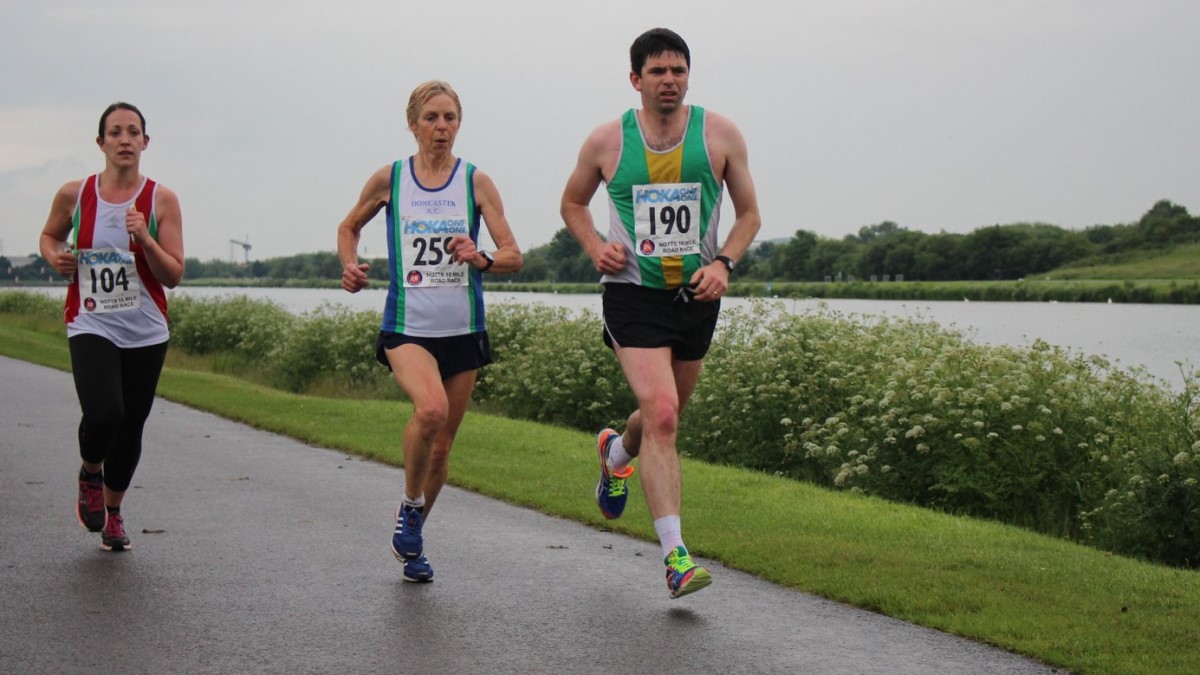
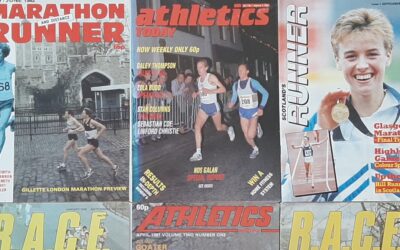
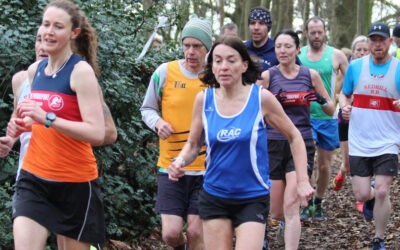
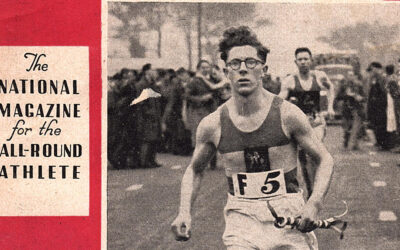
The Notts 10 played a significant role in my athletics life. I last ran it not too many years ago on a Friday night in the summer? I was hoping to run it again and am sorry to hear that Notts AC no longer organise it but am sure the new team will put on a good event. Unfortunately I am running the Chester 10 km that w/ e. 10 ml races seem to be scarce these days and are still a favourite of mine.
Good luck at the Chester 10km Eleanor. Thank you for your comment. I do hope that we can keep the race going as it would be a shame to lose it. Katie
Thanks for a good article. I remember the Notts 10 fondly on the old hilly course in the early/mid 1980s. At the time I ran with the lads on club nights, a tough 10 pounding the roads hanging on to Dick Milne and others: more of burn up than a club run. Gradually improving from hanger-on to half decent, I beat Dick in the 10 winning the bike that the had asked the organiser to line up for him; 49 something. The next year Adri Hartveld turned me over, even though it was my Pb for 10 run: 49 something low. Fond memories.
Hi Kevin, thank you for your comments. I enjoyed reading your article in the 20th anniversary book “My affair with the Notts 10”. The story about the bike is amusing. Your winning time in 1983 was 49:47 and Dick Milne was third. 1984 you won again in 50:32 and then 1986 Adri beat you but you ran 49:07. Fantastic times! Thank you for sharing your memories. Katie
great read never think to look into history of these events notts 10 is one of my favorites and have done it several times and glad it is being relaunched i think 10 mile is a good length to run a little more than a 10k and not quite a half marathon I wish there was a few more around the area.see you on the 11th march
Thank you Karen. I hope we can keep the race going and I look forward to seeing you on Saturday. Katie
I ran the Notts 10 in 1982 my second ever 10 mile aged almost 21. Unfortunately I recall they left one lap at a track off so it become a nine and 3/4 mile race! I still enjoyed the race and ran a time of 48 minutes 53 seconds. Would it be possible to send through the results of this race for my memories and reassure myself that I actually used to run that fast once!
Congratulations Adrian on your 6th place at the 1982 Notts 10 in 48:53!
I didn’t know the race was short that year. The runners ahead of you were:
A Jones Sutton St Helens 47:54
R Maule Coventry Godiva 47:57
R Milne Notts AC 47:58
D Allen Manchester Univ 48:02
C Hollingworth Holmfirth Harriers 48:47
You were nearly a minute ahead of the 7th placed runner. There were 306 finishers.
Katie
I did the notts 10 afew times did my best time there in 1994 lovely fri night event in june a 10 is agood distance did snake lane last week shame i cannot do this event on sat as ive got an event this weekend
Hi Glyn, I liked it being a Friday night event too. I would have been at Snake Lane 10 except that I’ve got an injury. Good luck for your race this weekend, Katie